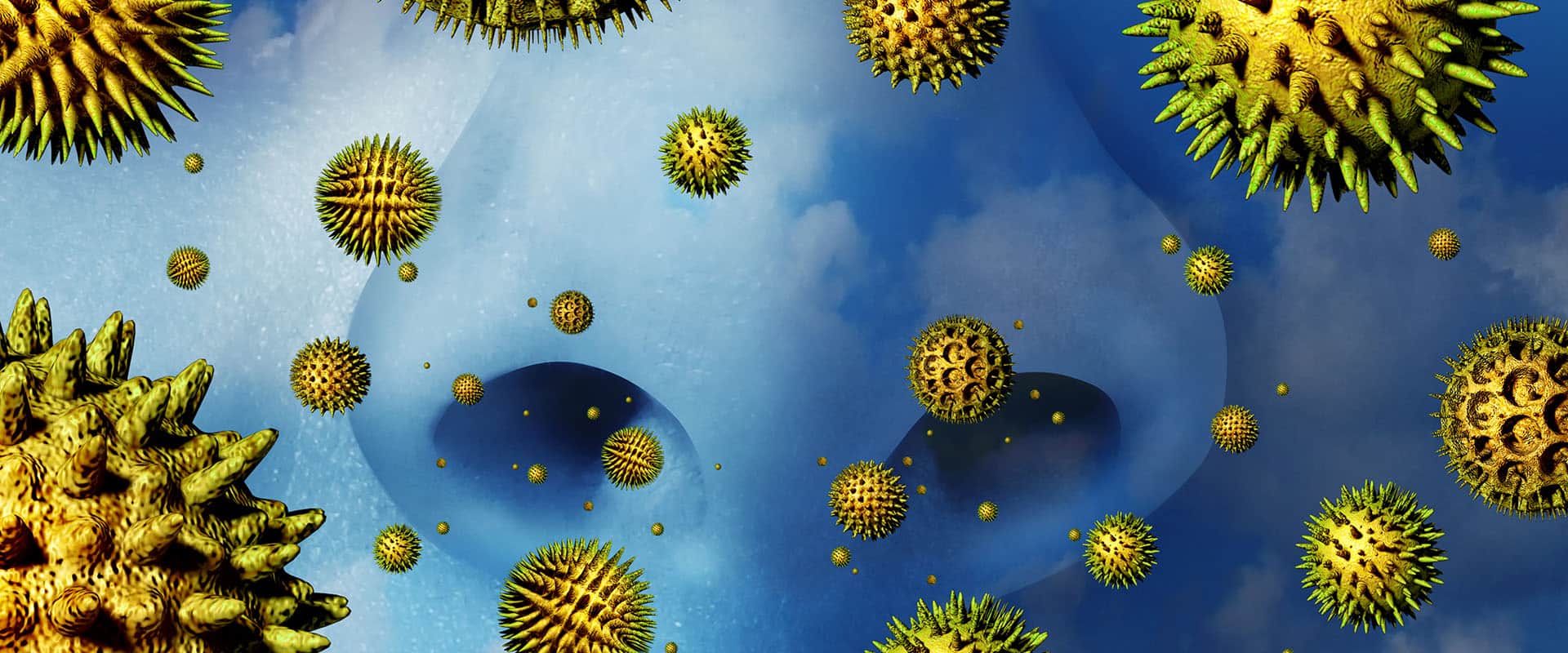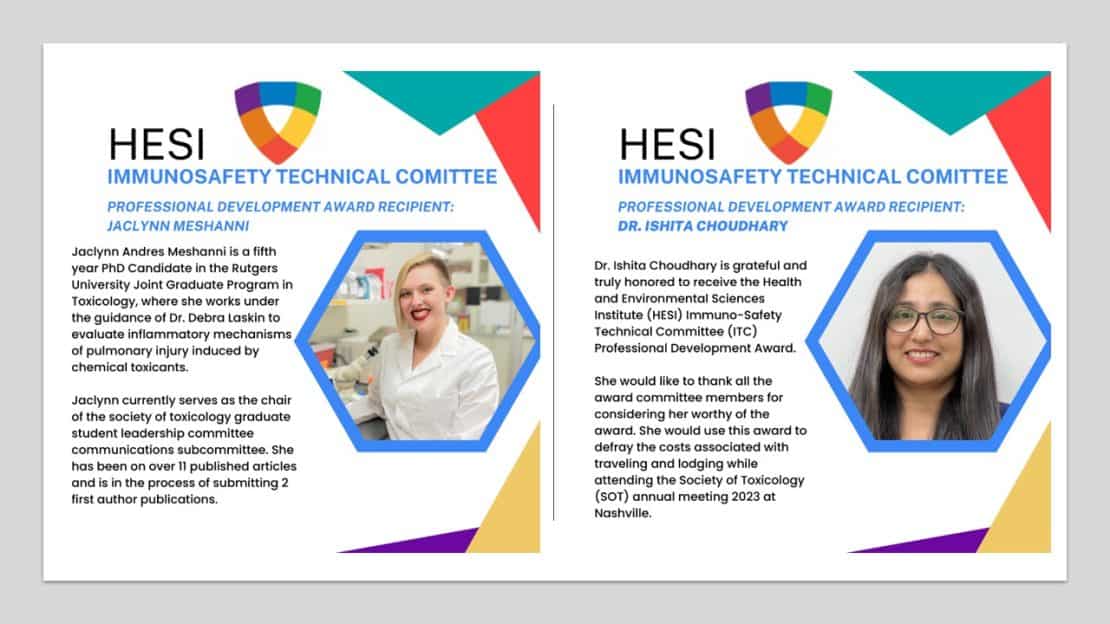Come learn about career options in the field of Immuno-Safety science!
HESI Immuno-Safety Career Symposium
March 26, 2024
Webinar, HESI Immuno-Safety Technical Committee

The mission of the HESI Immuno-Safety Technical Committee (ITC) is to identify and address scientific issues related to immune safety and translation to human health risk assessment.
Key Objectives:

The HESI ITC seeks graduate students working in immunology, toxicology, pathology, or related field for a second cycle of their new HESI ITC Mentorship Program. This program will allow meaningful interactions between trainees and mentors to give insight on various career pathways and discuss how to streamline the mentees’ long-term goals. The second cohort will tentatively be from May – June 2023 with 4-5 one-on-one mentor meetings. As well as an opportunity to network with past mentees and expert immuno-safety committee members at our ITC annual meeting (25-26 April 2023).
If you have any questions about the HESI ITC or this program, please contact Dr. Shermaine Mitchell-Ryan

1. Ishita Choudhary, Louisiana State University
Research area: Investigating the mechanisms of ozone and allergen induce lung injury.
2. Jaclynn Meshanni, Rutgers University
Research area: The role of Lipid homeostasis in macrophages and its impact on the development of Pulmonary fibrosis resulting from Nitrogen mustard exposure.
Regulatory Gaps
This group aims to provide a review of regulatory guidance documents with an educational lean to serve as a primary reference for state-of-the-art assays, models, regulatory guidance, and references.
Immunomodulation and Pregnancy Risk Assessment
This work aims to evaluate and incorporate learnings on preclinical immune safety assessment of pregnancy risk in the presence of immunomodulatory therapy. The 2020 FDA/CBER-HESI Immunomodulators and Pregnancy Risk Workshop convened key stakeholders to discuss both current and novel methodologies in preclinical and translational safety assessment of pregnancy risk associated with immunomodulatory therapy. Through the sharing of case examples, followed by longer in-depth discussion within each session, the goal was to begin to address gaps in biology, current tools, and other aspects of pregnancy risk that need to be considered during drug development. The 2020 HESI Symposium on Assessing Pregnancy Risk of Immunomodulators provided a broad overview of the role of the maternal immune system in the establishment, maintenance, and completion of a healthy pregnancy. The sessions covered both current and novel methodologies in preclinical and translational safety assessment of pregnancy risk associated with immunomodulatory therapy as well as address gaps in biology, current tools, and other aspects of pregnancy risk for consideration during drug development. An overview of marketed therapeutics highlighted current knowledge of the effects of immunomodulators on pregnancy in nonclinical animal models, potential class effects, and available data from patients exposed during pregnancy.
Nanomedicine (Nanopharmacology)
A position paper on the immunotoxicity assessment of nanomedicines is being developed.
NK/CTL Assays
Under the method development working group, this project team is developing a manuscript that provides the tools and assays available to assess either cytotoxic T lymphocyte (CTL) or natural killer (NK) cell function.
Examining the Use of Humanized Mice as a Preclinical Model in Drug Development
This project is designed to identify gaps/issues highlighted from a committee-wide survey regarding the use of the model and to design specific projects to resolve important issues identified.
Cytokine-Release Assay-In Vivo Cytokine Release
This project is evaluating what parameters contribute to the variability in cyno control animals.
FIH Dose Selection for Immunomodulators
This work aims to determine a suitable course of action for establishing a first-in-human (FIH) dose for various types of immunomodulators.
Drug Hypersensitivity Reactions
This work will develop a compendium on how to assess and test for drug hypersensitivity reactions in both preclinical and clinical settings.
Immunotoxicology Training Course
The ITC convenes an annual training course on immune safety science. The training course will transition to a virtual modular format to broaden the committee’s reach and add flexibility to course offerings.
Science Outreach
These efforts aim to develop resources and activities for outreach at select scientific meetings and to create a platform to advocate and educate the next generation of immuno-safety scientists.
ITC Website Development
An ITC-centric website where both scientists and the public can find information on the field of immuno-safety has been developed. Visit the website here: https://immunosafetyresource.org/
ITC Clearinghouse Database
This work aims to create a clearinghouse/database that contains resource information related to the field of immune safety and to share information internally and externally to drive education and outreach. Visit the database here: https://immunosafetyresource.org/itc-databases/



Université Paris-Saclay

Amgen, Inc.

GlaxoSmithKline
March 26, 2024
Webinar, HESI Immuno-Safety Technical Committee
Come learn about career options in the field of Immuno-Safety science!
February 29, 2024
Webinar, HESI Immuno-Safety Technical Committee
The HESI Immuno-Safety Technical (ITC) Committee welcomes Dr. Cara Buchanan from Wellcome Leap, who will present an overview of the immune-competent engineered human models supported by Project Hope.
September 22, 2023
Virtual, Event
The topic will be introduced by the Translational Immune Safety WG leads: Ana Goyos and Jean Sathish. This will be followed by short statements from our clinician scientist and a roundtable discussion.
April 21, 2023
HESI ITC, Mentorship Program
Applications are due 21 April 2023 for the HESI Immuno-Safety Mentorship Program.
March 19, 2023 – March 23, 2023
Nashville, TN, USA
A number of HESI committees will have presentations and posters at the Society of Toxicology Meeting in Nashville, TN.
October 18, 2022 – October 21, 2022
Hybrid meeting, hosted by the HESI ITC Committee
The HESI ITC Committee 2022 Fall Meeting will take place on October 18-21, 2022. The hybrid meeting is open to ITC Committee participants only.
Journal of Immunotoxicology, 2023
An insightful review by Kamperschoer et al. that provides an overview of the various methods for assessment of Cytotoxic T Lymphocytes (CTL) function in Non-Human Primates in the context of non-clinical safety assessment of immune-modulating therapeutic agents.
Regulatory Toxicology and Pharmacology, 2021
Over the last decade, immunotherapy has established itself as an important novel approach in the treatment of cancer, resulting in a growing importance in oncology. Engineered T cell therapies, namely chimeric antigen receptor (CAR) T cells and T cell receptor (TCR) T cell therapies, are platform technologies that have enabled ...
Cytokine, 2020
Author links open overlay Immunomodulatory therapeutics such as monoclonal antibodies (mAb) carry an inherent risk of undesired immune reactions. One such risk is cytokine release syndrome (CRS), a rapid systemic inflammatory response characterized by the secretion of pro-inflammatory cytokines from immune cells. It is ...
Journal of Immunotoxicology, 2020
Nonclinical immunotoxicity evaluation is an important component of safety assessment for pharmaceuticals. One in vitro assay that can be applied in a weight of evidence assessment is the human lymphocyte activation (HuLA) assay, an antigen recall assay, similar in many respects to the in vivo T-cell-dependent ...
Journal of Immunotoxicology, 2020
Currently, there is a multitude of CD3 bispecifics with different molecular designs and binding properties in preclinical and clinical development for the treatment of liquid or solid tumors. The key safety concerns with CD3 bispecifics are excessive release of cytokines, which may translate to potentially life-threating ...
Reproductive Toxicology, 2019
The developmental origins of human health and disease (DOHaD) is a growing field of health-related research that is based on the hypothesis that perturbations to the pre- or postnatal environment, in the form of xenobiotic exposure, stress, infections or nutritional deficits, may contribute to the manifestation of disease ...
hesi@hesiglobal.org
Phone: +1-202-659-8404
Fax: +1-202-659-3859
740 15th Street NW, Suite 600
Washington, DC 20005
Sign up for our monthly e-newsletter.